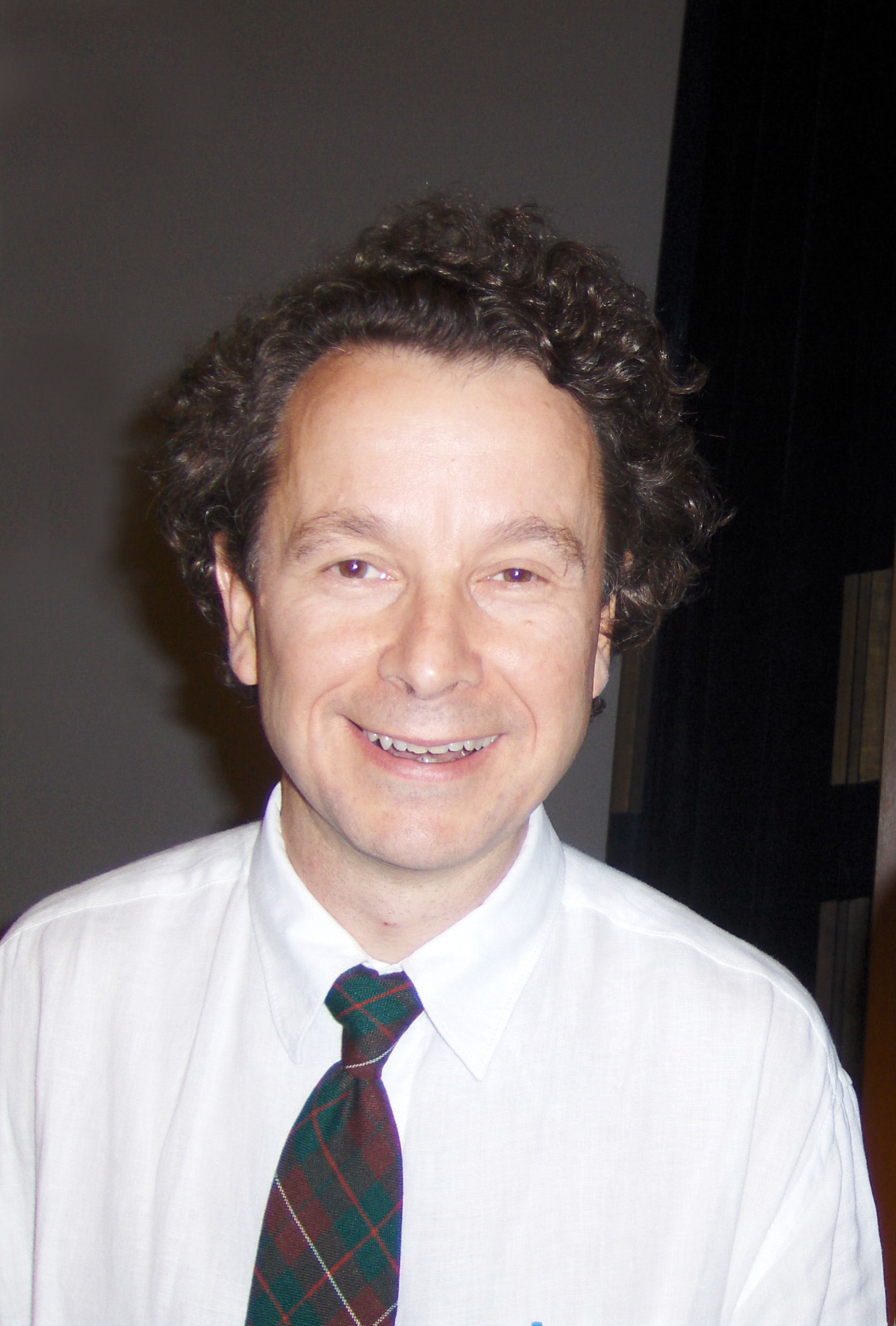- Roderick MacKinnon
Infobox Scientist
name = Roderick MacKinnon

image_size = 180px
birth_date = birth date|1956|02|19|df=yes
birth_place =Burlington, Massachusetts , USA
nationality =United States
field =Chemistry
work_places =Cornell University
alma_mater =University of Massachusetts Boston
doctoral_advisor =
doctoral_students =
known_for =
prizes =Nobel Prize in Chemistry (2003),
Albert Lasker Award for Basic Medical Research (1999),
Louisa Gross Horwitz Prize (2003)Roderick MacKinnon (born
19 February 1956 ) is a professor of Molecular Neurobiology andBiophysics atRockefeller University who won theNobel Prize in Chemistry together withPeter Agre in 2003 for his work on the structure and operation ofion channel s.Biography
MacKinnon was born in
Burlington, Massachusetts and went on to attend theUniversity of Massachusetts Boston . After one year, transferred toBrandeis University in order to intensify his studies in science. There he received a bachelor's degree inbiochemistry in 1978 while studyingcalcium transport overcell membrane s for his honors thesis at Christopher Miller's laboratory. It was also at Brandeis where he met his future wife and working-colleague Alice Lee.After receiving his degree from Brandeis, MacKinnon entered medical school at
Tufts University . He got his M.D. in 1982 and received training in Internal Medicine at Beth Israel Hospital in Boston. But he did not feel satisfied enough with the medical profession, so in 1986 he returned to Christopher Miller at Brandeis for postdoctoral studies. 1989 he was appointed assistant professor atHarvard University where he studied the interaction of thepotassium channel with a specific toxin derived from scorpion venom, acquainting himself with methods of protein purification andX-ray crystallography .In 1996 he moved to
Rockefeller University as a professor and head of the Laboratory of Molecular Neurobiology and Biophysics where he started to work on the structure of the potassium channel. These channels are of particular importance to thenervous system and the heart and enable potassium ions to cross thecell membrane .Before MacKinnon, the detailed molecular architecture of channels and the exact means by which they convey ions remained speculative. But in 1998, despite a barrier to the structural study of
integral membrane protein s that had thwarted most attempts for decades, MacKinnon and colleagues unlocked the three-dimensional molecular structure of a potassium channel from bacteria withX-ray crystallography . This way, he was able to explain the selectivity of this channel for potassium ions - it lets only potassium ions pass while the much smallersodium ions can not pass through. [MacKinnon Roderick, Steven L. Cohen, Anling Kuo, Alice Lee, Brian T. Chait: "Structural Conservation in Prokaryotic and Eukaryotic Potassium Channels". Science 3 April 1998: Vol. 280. no. 5360, pp. 106 - 109. PMID 9525854] [ Declan A. Doyle, João Morais Cabral, Richard A. Pfuetzner, Anling Kuo, Jacqueline M. Gulbis, Steven L. Cohen, Brian T. Chait, Roderick MacKinnon: "The Structure of the Potassium Channel: Molecular Basis of K+ Conduction and Selectivity". Science 3 April 1998: Vol. 280. no. 5360, pp. 69 - 77. PMID 9525859] Science Magazine called the achievement "one of the 10 biggest science stories of 1998."His prize-winning research was conducted primarily at the
Cornell High Energy Synchrotron Source (CHESS) ofCornell University , and at theNational Synchrotron Light Source (NSLS) ofBrookhaven National Laboratory .In 1999, MacKinnon shared the
Albert Lasker Award for Basic Medical Research withClay Armstrong andBertil Hille - one of most distinguished honor for outstanding contributions to basic and clinical medical research. In 2000 he was elected to the U.S. National Academy of Sciences and has received numerous other awards for his research, including the 2000Rosenstiel Award and the 2001 Gairdner Foundation International Award. In 2003 he won theLouisa Gross Horwitz Prize fromColumbia University and theNobel Prize in Chemistry .He is a member of the Alpha Omega Medical Honor Society, a PEW scholar in the BioMedical Sciences and the recipient of the McKnight Scholars Award, the Biophysical Society Young Investigator Award, the McKnight Investigator Award, the W. Alden Spencer Award and the AAAS
Newcomb Cleveland Prize .References
External links
* [http://www.osti.gov/accomplishments/mackinnon.html Biography and Bibliographic Resources] , from the
Office of Scientific and Technical Information ,United States Department of Energy
* [http://nobelprize.org/nobel_prizes/chemistry/laureates/2003/index.html Winner of the 2003 Nobel Prize in Chemistry]
* [http://www.laskerfoundation.org/awards/library/1999basic.shtml Winner of the 1999 Albert Lasker Award for Basic Medical Research]
* [http://www.vega.org.uk/video/programme/121 Interview with Roderick MacKinnon by Harry Kroto] Freeview video provided by the Vega Science Trust.
* [http://nobelprize.org/nobel_prizes/chemistry/laureates/2003/mackinnon-lecture.html Nobel Lecture] "Potassium Channels and the Atomic Basis of Selective Ion Conduction"
* [http://www.rockefeller.edu/labheads/mackinnon/mackinn-lab.php Website of his lab at the Rockefeller University]
* [http://osulibrary.oregonstate.edu/specialcollections/events/2008legacyaward/video-mackinnon.html Ion Channel Chemistry: The Electrical System of Life] Transcribed video of a May 2008 talk by MacKinnon, sponsored by theOregon State University Libraries.
* [http://www.cumc.columbia.edu/horwitz/ The Official Site of Louisa Gross Horwitz Prize]
Wikimedia Foundation. 2010.
